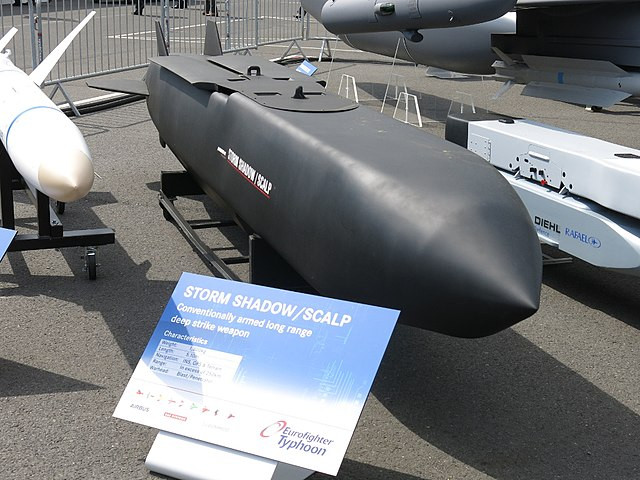The United States and the United Kingdom are reportedly close to lifting restrictions that prevent Ukraine from using long-range missiles against targets inside Russia, according to officials familiar with the discussions. The move would mark a significant escalation in Western support for Kyiv and could reshape the dynamics of the ongoing conflict.
The potential policy shift comes as Keir Starmer, leader of the UK's Labour Party, meets with President Joe Biden at the White House on Friday. The agenda is expected to focus on the war in Ukraine and the anticipated decision to allow Ukraine to utilize Storm Shadow missiles against Russian targets.
This development follows a series of high-level diplomatic engagements, including visits to Kyiv by U.S. Secretary of State Antony Blinken and UK Foreign Secretary David Lammy earlier this week. While no official announcement has been made, insiders suggest that the decision has been reached in private.
What Are Storm Shadow Missiles?
Storm Shadow missiles are advanced Anglo-French cruise missiles with a range of approximately 155 miles (250 kilometers), capable of striking deep into Russian territory. Designed to fly at near-supersonic speeds while hugging the terrain, these missiles are adept at penetrating hardened bunkers, ammunition depots, and airfields. Each missile carries a substantial price tag of nearly $1 million.
Manufactured through a collaboration involving the UK, France, Italy, and components from the United States, any change in the conditions of their use would require agreement from all participating nations.
Why Does Ukraine Want Them Now?
Ukraine has been under relentless bombardment from Russian forces, with missiles and glide bombs launched from deep within Russian territory targeting Ukrainian cities and frontline positions. Kyiv argues that its inability to strike back at the sources of these attacks severely hampers its defensive capabilities.
"Not being allowed to hit the bases these attacks are launched from is akin to fighting with one arm tied behind our back," a Ukrainian defense official said.
While Ukraine possesses domestically produced long-range drones, their limited payload and susceptibility to interception reduce their effectiveness. The ability to deploy Storm Shadow missiles against Russian targets could significantly enhance Ukraine's capacity to disrupt Russian military operations.
Western Hesitation and Changing Dynamics
Until now, Western allies have been reluctant to allow Ukraine to use Western-supplied missiles inside Russia, fearing escalation that could draw NATO directly into the conflict. Russian President Vladimir Putin has warned that such a move would mean NATO is "at war" with Moscow, stating, "This would significantly change the nature of the conflict."
However, several factors have prompted a reconsideration. Ukraine faces mounting pressure on the frontline and anticipates a challenging winter ahead. Recent Ukrainian incursions into Russia's Kursk region and increased success in drone strikes deep into Russian territory have reframed the strategic calculus.
"There is a growing recognition that Ukraine needs the capability to strike back effectively," said Matthew Savill, director of military sciences at the Royal United Services Institute (RUSI). "Lifting restrictions on long-range missile use inside Russia could change the dynamics on the ground."
Additionally, reports that Russia has received new ballistic missiles from Iran have heightened concerns among Western officials. UK Foreign Secretary David Lammy hinted that this development has influenced strategic thinking in London and Washington.
Potential Impact and Risks
Allowing Ukraine to deploy Storm Shadow missiles inside Russia could disrupt Russian military logistics, command centers, and air support operations. "It will make military logistics, command and control, and air support harder to deliver," said Justin Crump, a military analyst and CEO of Sibylline consultancy. "Even if Russian aircraft pull back further from Ukraine's frontiers, they will suffer increased time and costs per sortie to the frontline."
However, there are concerns about the potential risks. An inadvertent strike causing civilian casualties could escalate tensions and complicate Western support. "A strike that caused significant civilian casualties could be very problematic," warned Mr. Savill. "If it was carried out with a Storm Shadow missile, it would be hard to deny Western involvement."
Moreover, Russia has already taken precautions by moving key military assets further inland, beyond the reach of current Ukrainian capabilities. Analysts caution that Ukraine's limited stockpile of these expensive missiles may limit their overall impact.
Russia's Response and Escalation Fears
President Putin has accused the West of direct involvement, claiming that "only servicemen of NATO countries can input flight missions into these missile systems." He added that Ukraine relies on Western satellite intelligence for target selection.
These assertions have been met with skepticism. "If that claim were true, Russia would have made it more clearly when the weapons were first supplied," Mr. Crump countered. "The missile is available for export sales; is Russia seriously saying any buyer would need a NATO team to operate it?"
The fear of escalation remains a central concern for Western policymakers. The Biden administration worries that enabling Ukraine to strike deep into Russia could provoke Moscow into retaliating against supply routes or even NATO territory, potentially invoking Article 5 of the NATO treaty.
Balancing Support and Escalation
Throughout the conflict, the U.S. and its allies have sought to provide Ukraine with necessary defensive capabilities while avoiding steps that could be perceived as overly provocative. The potential lifting of restrictions on Storm Shadow missiles reflects a delicate balancing act.
"There is an inherent tension in how these weapons can be effective," Mr. Savill noted. "By degrading Russia's ability to strike against Ukraine, but also by bringing the war further onto Russian soil, it might make the costs to Putin more acute."




